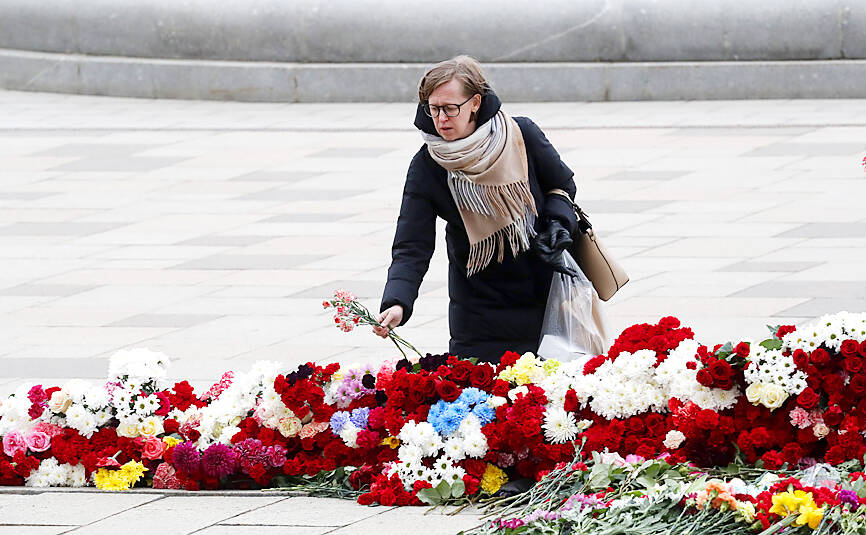Russian President Vladimir Putin on Monday said for the first time that “radical Islamists” were behind last week’s attack on a concert hall outside Moscow, but suggested they were linked to Ukraine somehow.
Eleven people have been detained in connection with the attack, which saw camouflaged gunmen storm into Crocus City Hall, open fire on concertgoers and set the building ablaze, killing at least 139 people.
“We know that the crime was committed by the hands of radical Islamists, whose ideology the Islamic world itself has been fighting for centuries,” Putin said in a televised meeting.

Photo: EPA-EFE
However, the Russian leader said that “many questions” remained unanswered, including why the attackers tried to flee to Ukraine — a claim that Kyiv has rejected.
“Of course, it is necessary to answer the question, why, after committing the crime, the terrorists tried to go to Ukraine. Who was waiting for them there?” Putin asked.
“This atrocity might be just a link in a whole series of attempts by those who have been at war with our country since 2014,” he said, referring to Ukraine and its allies.
Ukraine has described accusations it was involved as absurd.
“Putin was talking to himself again, and it was again broadcast on television. Again, he blames Ukraine,” Ukrainian President Volodymyr Zelenskiy said in his evening address.
The Islamic State group has said several times since Friday last week that it was responsible and Islamic State-affiliated media channels have published graphic videos of the gunmen inside the venue.
When asked about Islamic State’s claimed involvement, Kremlin spokesman Dmitry Peskov on Monday said that an investigation was still ongoing.
Officials expect the death toll to rise further, as rescuers were searching the site for remains on Monday and 97 people were still in hospital.
The Kremlin has expressed confidence in the nation’s security agencies, despite swirling questions over how they failed to thwart the massacre amid public and private warnings by the US’ intelligence apparatus.
In a series of late-night hearings in Moscow that ran into the early hours of Monday, four of the suspects — with bruises and cuts on their swollen faces — were dragged in to the capital’s Basmanny District Court before dozens of reporters.
FSB officers wheeled one into the hearing on a gurney, his eyes barely open.
Peskov refused to comment on reports and videos on social media that showed bloody interrogations of the suspects after they were arrested on Saturday.
The court identified them as Muhammadsobir Fayzov, Shamsidin Fariduni, Rachabalizoda Saidakrami and Dalerjon Mirzoyev. Russian state media said they were all citizens of Tajikistan.
Two of them pleaded guilty, the court said.
Three other suspects, whom Russian media identified as family members Aminchon Islomov, Dilovar Islomov and Isroil Islomov, were remanded in pretrial detention on Monday.
One of those detained has Russian citizenship, Interfax news agency reported.
All of those held in custody have been charged with terrorism and face up to life in prison.
The Kremlin has pushed back at suggestions that the death penalty would be reintroduced.

Malaysia yesterday installed a motorcycle-riding billionaire sultan as its new king in lavish ceremonies for a post seen as a ballast in times of political crises. The coronation ceremony for Malaysia’s King Sultan Ibrahim, 65, at the National Palace in Kuala Lumpur followed his oath-taking in January as the country’s 17th monarch. Malaysia is a constitutional monarchy, with a unique arrangement that sees the throne change hands every five years between the rulers of nine Malaysian states headed by centuries-old Islamic royalty. While chiefly ceremonial, the position of king has in the past few years played an increasingly important role. Royal intervention was

X-37B COMPARISON: China’s spaceplane is most likely testing technology, much like US’ vehicle, said Victoria Samson, an official at the Secure World Foundation China’s shadowy, uncrewed reusable spacecraft, which launches atop a rocket booster and lands at a secretive military airfield, is most likely testing technology, but could also be used for manipulating or retrieving satellites, experts said. The spacecraft, on its third mission, was last month observed releasing an object, moving several kilometers away and then maneuvering back to within a few hundred meters of it. “It’s obvious that it has a military application, including, for example, closely inspecting objects of the enemy or disabling them, but it also has non-military applications,” said Marco Langbroek, a lecturer in optical space situational awareness at Delft

The Philippine Air Force must ramp up pilot training if it is to buy 20 or more multirole fighter jets as it modernizes and expands joint operations with its navy, a commander said yesterday. A day earlier US National Security Adviser Jake Sullivan said that the US “will do what is necessary” to see that the Philippines is able to resupply a ship on the Second Thomas Shoal (Renai Shoal, 仁愛暗沙) that Manila uses to reinforce its claims to the atoll. Sullivan said the US would prefer that the Philippines conducts the resupplies of the small crew on the warship Sierra Madre,

AIRLINES RECOVERING: Two-thirds of the flights canceled on Saturday due to the faulty CrowdStrike update that hit 8.5 million devices worldwide occurred in the US As the world continues to recover from massive business and travel disruptions caused by a faulty software update from cybersecurity firm CrowdStrike, malicious actors are trying to exploit the situation for their own gain. Government cybersecurity agencies across the globe and CrowdStrike CEO George Kurtz are warning businesses and individuals around the world about new phishing schemes that involve malicious actors posing as CrowdStrike employees or other tech specialists offering to assist those recovering from the outage. “We know that adversaries and bad actors will try to exploit events like this,” Kurtz said in a statement. “I encourage everyone to remain vigilant